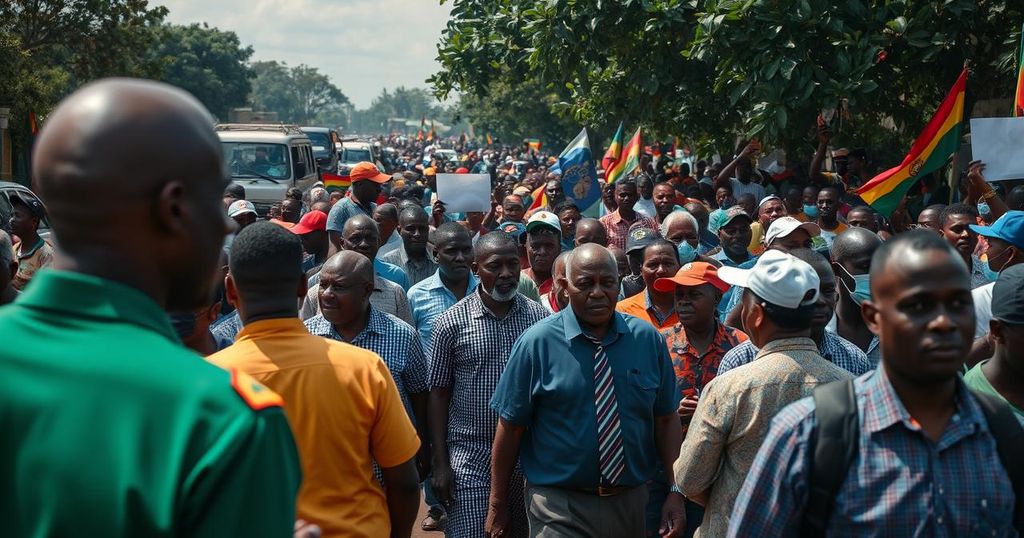Allegations of Electoral Fraud Cloud Mozambique’s Election Results
Mozambique’s recent elections are enveloped in allegations of significant fraud by the ruling FRELIMO party, with candidate Daniel Chapo expected to win. Opposition candidate Venancio Mondlane claims he is the victim of extensive election rigging. Observers note a potential decline in Renamo’s influence, with Podemos potentially replacing it. Allegations of illegal voting by non-citizens, particularly from Zimbabwe, further complicate the situation, prompting calls for independent investigations.
The electoral process in Mozambique is currently marred by allegations of substantial fraud, with the ruling party, the Liberation Front of Mozambique (FRELIMO), poised to claim victory in the recent elections. The official results have not yet been published, but the party has dominated the voting in major areas, including the capital, Maputo, where candidate Daniel Chapo reportedly received 53.68% of the votes. Opposition candidate Venancio Mondlane, who ran as an independent after departing Renamo, asserts that he was subjected to grave electoral malpractice, stating that the current situation reflects “election rigging of the highest order.” The voting distribution shows Mondlane received 33.84%, while other candidates, including Renamo’s Ossufo Momade and Lutero Simango from the MDM (Democratic Movement of Mozambique), garnered only 9% and 3%, respectively. FRELIMO representatives have expressed satisfaction with the results, claiming they reflect the people’s will and highlight the transparency of the electoral process. In the conflict-ridden Cabo Delgado region, FRELIMO again led with 66% of the votes. However, analysts indicate a decline in support for Renamo, suggesting that a new political force, Podemos, which backed Mondlane’s candidacy, may rise to take its place. With Renamo’s historical context of conflict against FRELIMO’s regime, the present election results could substantially alter the political dynamics of Mozambique. Renamo has officially challenged the validity of the votes in eight districts citing interference and demanding that the election commission annul the results. Reports of organized issues by electoral authorities and allegations of voters being barred from polling or having their names removed from voter lists have emerged. Manuel de Araujo, Renamo’s candidate for Zambezia governor, has embarked on a campaign to highlight these irregularities on an international stage. He claims systemic issues prevented adequate staffing and materials at polling stations, resulting in thousands being unable to cast their votes. Notably, irregularities were also reported among Mozambicans living abroad. Allegations surfaced that thousands of Zimbabweans were allowed to vote illegally, reportedly at the behest of their ruling party, Zanu-PF, which has a close alliance with FRELIMO. Former Zanu-PF city councilor Edison Manyawi openly admitted to voting for FRELIMO, asserting their solidarity based on historical ties. This situation raises significant concerns regarding electoral integrity, prompting demands for independent investigations to address these violations.
Mozambique has a complex political history characterized by conflict and a struggle for governance. The FRELIMO party has maintained power since the country gained independence from Portugal in 1975, with recent elections highlighting a potential shift in political allegiance from traditional opposition parties. Renamo, the main opposition party, emerged from a civil war against FRELIMO and has faced challenges in maintaining its relevance in the political landscape amid allegations of electoral malfeasance. The recent elections have intensified scrutiny over the integrity of the electoral process, especially regarding claims of voter manipulation and participation by non-citizens in the voting process.
The ongoing situation in Mozambique’s elections reveals a critical examination of the electoral integrity and democratic processes in the country. With significant allegations of fraud and irregularities, particularly involving non-citizen voter participation and suppression of Renamo supporters, the path forward remains uncertain. The outcomes of these elections could redefine the political landscape, potentially diminishing Renamo’s standing and possibly elevating new political movements. As credible allegations continue to surface, the call for thorough investigations is imperative to uphold the democratic principles of Mozambique.
Original Source: www.dw.com




Post Comment